张培基散文佳作108篇
张培基散文佳作108篇详解
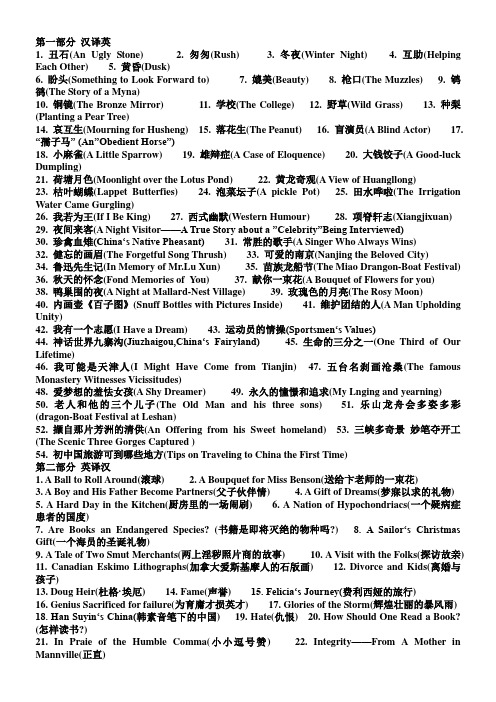
第一部分汉译英1. 丑石(An Ugly Stone)2. 匆匆(Rush)3. 冬夜(Winter Night)4. 互助(Helping Each Other)5. 黄昏(Dusk)6. 盼头(Something to Look Forward to)7. 媲美(Beauty)8. 枪口(The Muzzles)9. 鸲鹆(The Story of a Myna)10. 铜镜(The Bronze Mirror) 11. 学校(The College) 12. 野草(Wild Grass) 13. 种梨(Planting a Pear Tree)14. 哀互生(Mourning for Husheng) 15. 落花生(The Peanut) 16. 盲演员(A Blind Actor) 17. “孺子马” (An”Obedient Horse”)18. 小麻雀(A Little Sparrow) 19. 雄辩症(A Case of Eloquence) 20. 大钱饺子(A Good-luck Dumpling)21. 荷塘月色(Moonlight over the Lotus Pond) 22. 黄龙奇观(A View of Huangllong)23. 枯叶蝴蝶(Lappet Butterfies) 24. 泡菜坛子(A pickle Pot) 25. 田水哗啦(The Irrigation Water Came Gurgling)26. 我若为王(If I Be King) 27. 西式幽默(Western Humour) 28. 项脊轩志(Xiangjixuan)29. 夜间来客(A Night Visitor——A True Story about a ”Celebrity”Being Interviewed)30. 珍禽血雉(China‘s Native Pheasant)31. 常胜的歌手(A Singer Who Always Wins)32. 健忘的画眉(The Forgetful Song Thrush) 33. 可爱的南京(Nanjing the Beloved City)34. 鲁迅先生记(In Memory of Mr.Lu Xun) 35. 苗族龙船节(The Miao Drangon-Boat Festival) 36. 秋天的怀念(Fond Memories of You) 37. 献你一束花(A Bouquet of Flowers for you)38. 鸭巢围的夜(A Night at Mallard-Nest Village) 39. 玫瑰色的月亮(The Rosy Moon)40. 内画壶《百子图》(Snuff Bottles with Pictures Inside) 41. 维护团结的人(A Man Upholding Unity)42. 我有一个志愿(I Have a Dream) 43. 运动员的情操(Sportsmen‘s Values)44. 神话世界九寨沟(Jiuzhaigou,China‘s Fairyland)45. 生命的三分之一(One Third of Our Lifetime)46. 我可能是天津人(I Might Have Come from Tianjin) 47. 五台名刹画沧桑(The famous Monastery Witnesses Vicissitudes)48. 爱梦想的羞怯女孩(A Shy Dreamer) 49. 永久的憧憬和追求(My Lnging and yearning) 50. 老人和他的三个儿子(The Old Man and his three sons) 51. 乐山龙舟会多姿多彩(dragon-Boat Festival at Leshan)52. 撷自那片芳洲的清供(An Offering from his Sweet homeland) 53. 三峡多奇景妙笔夺开工(The Scenic Three Gorges Captured )54. 初中国旅游可到哪些地方(Tips on Traveling to China the First Time)第二部分英译汉1. A Ball to Roll Around(滚球)2. A Boupquet for Miss Benson(送给卞老师的一束花)3. A Boy and His Father Become Partners(父子伙伴情)4. A Gift of Dreams(梦寐以求的礼物)5. A Hard Day in the Kitchen(厨房里的一场闹刷)6. A Nation of Hypochondriacs(一个疑病症患者的国度)7. Are Books an Endangered Species? (书籍是即将灭绝的物种吗?) 8. A Sailor‘s Christmas Gift(一个海员的圣诞礼物)9. A Tale of Two Smut Merchants(两上淫秽照片商的故事) 10. A Visit with the Folks(探访故亲) 11. Canadian Eskimo Lithographs(加拿大爱斯基摩人的石版画) 12. Divorce and Kids(离婚与孩子)13. Doug Heir(杜格·埃厄) 14. Fame(声誉) 15. Felicia‘s Journey(费利西娅的旅行)16. Genius Sacrificed for failure(为育庸才损英才) 17. Glories of the Storm(辉煌壮丽的暴风雨) 18. Han Suyin‘s China(韩素音笔下的中国) 19. Hate(仇恨) 20. How Should One Read a Book? (怎样读书?)21. In Praie of the Humble Comma(小小逗号赞) 22. Integrity——From A Mother in Mannville(正直)23. In the Pursuit of a Haunting and Timeless Truth(追寻一段永世难忘的史实)24. Killer on Wings is Under Threat(飞翔的杀手正受到威胁) 25. Life in a Violin Case(琴匣子中的生趣)26. Love Is Not like Merchandise(爱情不是商品) 27. Luck(好运气) 28. Mayhew(生活的道路)29. My Averae Uncle(艾默大叔——一个普通人) 30. My Father‘s Music(我父亲的音乐) 31. My Mother‘s Gift (母亲的礼物)32. New Light Buld Offers Energy Efficiency(新型灯泡提高能效) 33. Of Studies(谈读书)34. On Leadership(论领导) 35. On Cottages in General(农舍概述) 36. Over the Hill(开小差) 37. Promise of Bluebirds(蓝知更鸟的希望) 38. Stories on a Headboard(床头板上故事多)39. Sunday(星期天) 40. The Blanket(一条毛毯) 41. The Colour of the Sky(天空的色彩) 42. The date Father Didn‘t Keep(父亲失约) 43. The Kiss(吻) 44. The Letter(家书)45. The Little Boat That Sailed through Time(悠悠岁月小船情) 46. The Living Seas(富有生命的海洋)47. The Roots of My Ambition(我的自强之源) 48. The song of the River(河之歌)49. They Wanted Him Everywhere——Herbert von Karajan(1908-1989) (哪儿都要他)50. Three Great Puffy Rolls(三个又大双暄的面包圈) 51. Trust(信任)52. Why measure Life in Hearbeats? (何必以心跳定生死?) 53. Why the bones Break(骨折缘何而起)54. Why Women Live Longer than Men(为什么女人经男人活得长)丑石贾平凹我常常遗憾我家门前的那块丑石呢:它黑黝黝地卧在那里,牛似的模样;谁也不知道是什么时候留在这里的.谁也不去理会它。
翻译硕士张培基散文选之西欧的夏天
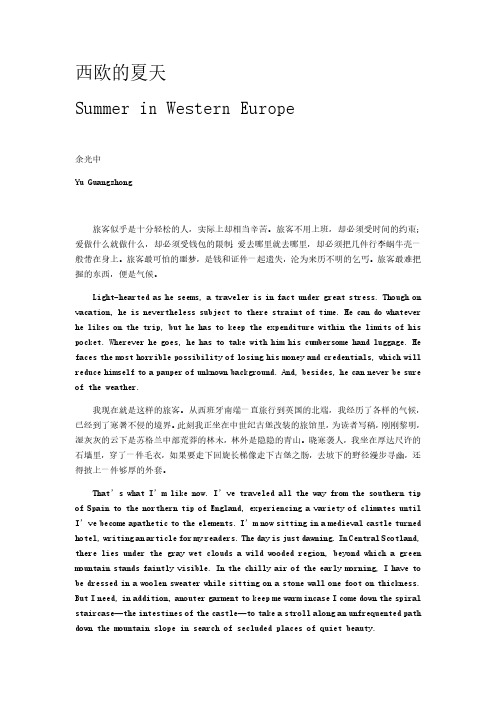
西欧的夏天Summer in Western Europe余光中Yu Guangzhong旅客似乎是十分轻松的人,实际上却相当辛苦。
旅客不用上班,却必须受时间的约束;爱做什么就做什么,却必须受钱包的限制;爱去哪里就去哪里,却必须把几件行李蜗牛壳一般带在身上。
旅客最可怕的噩梦,是钱和证件一起遗失,沦为来历不明的乞丐。
旅客最难把握的东西,便是气候。
Light-hearted as he seems, a traveler is in fact under great stress. Though on vacation, he is nevertheless subject to there straint of time. He can do whatever he likes on the trip, but he has to keep the expenditure within the limits of his pocket. Wherever he goes, he has to take with him his cumbersome hand luggage. He faces the most horrible possibility of losing his money and credentials, which will reduce himself to a pauper of unknown background. And, besides, he can never be sure of the weather.我现在就是这样的旅客。
从西班牙南端一直旅行到英国的北端,我经历了各样的气候,已经到了寒暑不侵的境界。
此刻我正坐在中世纪古堡改装的旅馆里,为读者写稿,刚刚黎明,湿灰灰的云下是苏格兰中部荒莽的林木,林外是隐隐的青山。
晓寒袭人,我坐在厚达尺许的石墙里,穿了一件毛衣,如果要走下回旋长梯像走下古堡之肠,去坡下的野径漫步寻幽,还得披上一件够厚的外套。
散文张培基乌篷船

散文张培基乌篷船一条曲曲折折,蜿蜿蜒蜒的西江在粤中大地上延伸,流淌。
世世代代,祖祖辈辈的哺育着江两岸的普通人家。
我是一个普通人家里的孩子,那汪清莹,碧绿的江水,自我能记事的那天起便是那么迅速的,静静的走进了我的记忆,流入我的生命,使我的一生与它结下不解之缘。
和许多沿江居住的普通一样,我家的日子并不宽裕,父亲读的书不多,且无一技之长,到城里打工,不久便发觉呆不下去,只好返回家,秉承祖辈打鱼的旧业,去勉强完成一个男人养家糊口的责任与义务。
为了使家里人能生活的好,父亲总是很勤劳的捕鱼。
每天清晨,他便拿着鱼网,带着鱼筐,步向那汪西江水,开始他一天的工作,撒网,收网,然后把捕获的鱼倒入筐中,就这样,折腾一天,父亲总能得到好的收获,那进我和小妹都很小,帮不上忙,只能呆呆地趴在窗台上,看父亲在江上捕鱼的背影。
见父亲满载而归时,我们便从屋里跑出,企图以我们微弱的力量帮父亲提鱼,每到这时,父亲那被江风和岁月不断雕塑而布满苍桑的面孔会浮起一丝丝欣慰的笑容,但又略带紧张的说:小心,不要把鱼筐弄翻了。
此时,母亲已把鱼网晒开走了回来,微笑着从我们手里拿过鱼筐,并说:傻孩子,别添乱。
晚上,我们一家便围在一起,把大小不同的鱼分开,第二天一大早,母亲便拿着鱼到集市卖,挣得家用,而父亲便又拿起那鱼网,开始新一轮的工作,在那段年月里,我们一家虽然过着并不富裕的日子,但我们的生活却时时刻刻都洋溢着令人心醉的温馨亲情和知足常乐。
日子就这样,如西江水般静静流淌,后来,我和小妹都上学了,面对徒然增加的教育开支,父亲只好咬咬牙,更加起早摸黑的捕鱼,而此刻,长年的劳苦,终于将母亲本来很健硕的身体拖跨,更糟糕的是,父亲最近捕的鱼也越来越少,原来他一向只在岸边捕鱼,范围有限,多年来,近似无休止的捕获,在岸边生活的鱼基本上都捞上岸了,村里人一直在劝父亲要有一,但由于家里积蓄不多,父亲都拒绝了,而这一下子,我和小妹的学费、母亲体弱我多病的医疗及家庭的日常开支,一切与钱挂上钩的问题接踵而来,冲击着这个本来就已经脆弱的家庭,而我们一家原来幸福的生活也掀起了波澜,变得难以平静此刻,父亲一语不说,呆坐在一边,默默的吸着他的旱烟,以前他并无这一习惯,也许生活的太多无奈,使他只能靠在阵阵烟圈中寻求安慰和解脱,就这样,沉默了许久,父亲最后还是站起来,大声说:我要有一只船,我要有一只船!第二天,父亲拿出家里仅有的积蓄,跑到城里,买了一些木材和几块乌篷。
上海外国语大学考研:如何复习《张培基散文集》和《散文佳作108篇》
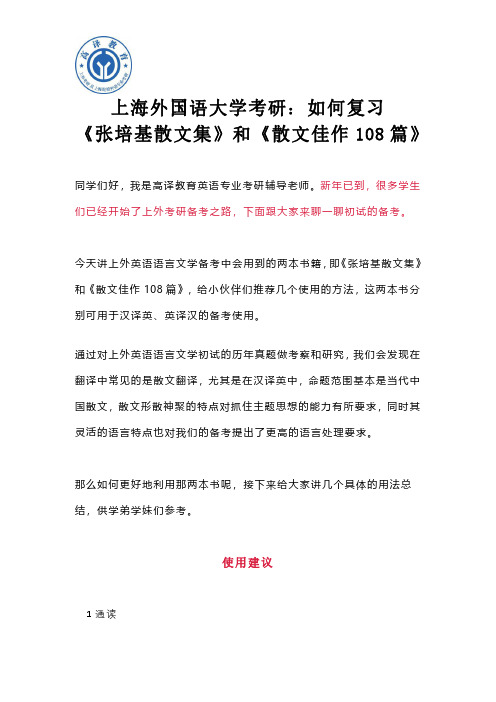
上海外国语大学考研:如何复习《张培基散文集》和《散文佳作108篇》同学们好,我是高译教育英语专业考研辅导老师。
新年已到,很多学生们已经开始了上外考研备考之路,下面跟大家来聊一聊初试的备考。
今天讲上外英语语言文学备考中会用到的两本书籍,即《张培基散文集》和《散文佳作108篇》,给小伙伴们推荐几个使用的方法,这两本书分别可用于汉译英、英译汉的备考使用。
通过对上外英语语言文学初试的历年真题做考察和研究,我们会发现在翻译中常见的是散文翻译,尤其是在汉译英中,命题范围基本是当代中国散文,散文形散神聚的特点对抓住主题思想的能力有所要求,同时其灵活的语言特点也对我们的备考提出了更高的语言处理要求。
那么如何更好地利用那两本书呢,接下来给大家讲几个具体的用法总结,供学弟学妹们参考。
使用建议1通读进行任何翻译之前首先要做的是对全文做通篇阅读,通过阅读掌握文章的行文风格、语言特点、主题思想,只有先准确抓住中心思想,才可能体会作者的真情实意,才能够读出原文的言外之意,继而在翻译过程中能够及时准确地补充字句,有些地方也才能够精简地表达。
由此看来,在备考翻译这一门时必须先提升自身的文学素养,而文学素养的提升没有捷径,只有通过大量的输入,广泛阅读,不断积少成多,慢慢提高对文章的理解。
对于这两套书,大家首先要做的就是作为阅读材料,对每一篇文章进行精读,养成良好的阅读习惯:通篇阅读,进行分段,提炼出主题思想,用一句话总结出作者的根本观点,并且写下文章的风格和语言特点。
每天至少要读2篇,在八月之前将材料至少通读过一遍。
具体怎么读呢?以《散文佳作108篇》的《风筝》为例,我们可以取其中一个句子来进行阅读和翻译——北京的冬季,地上还有积雪,灰黑色的秃树枝丫叉于晴朗的天空中,而远处有一二风筝浮动,在我是一种惊异和悲哀。
In the winter of Beijing,with snow still on the ground and dark-gray branches up in the brisk air,a couple of kites werefluttering up in the distance against the sunny sky-a sight that filled me with amazement and forlornness.【刘士聪译】解析:原文“北京的冬季”,地上的积雪,“晴朗的天空”,“灰黑色的秃树枝丫”和远处浮动的“风筝”,构成一幅北京残冬的画面,使作者想起童年的往事,因而感到“惊异和悲哀”。
英语学院英语专业八级备考推荐书目

英语学院英语专业八级考试备考推荐书目I. 考试指南以及真题精讲1. 《新编高等学校英语专业八级考试指南(TEM8)修订版》作者:邹申出版社:上海外语教育出版社2. 《全新英语专业八级考试指南(第2版)》作者:邹申出版社:上海外语教育出版社3. 《英语专业八级—全真点评精解》主编:李清华出版社:世界图书出版公司II.单项技能训练(同类一本即可)A. 阅读:1. 《英语专业八级阅读200篇(第三版)》编著:常春藤英语考试研究组出版社:上海交通大学出版社2.《英语专业八级考试单项突破系列•TEM8阅读理解》编者:孟利, 吉文凯主编:邹申出版社:上海外语教育出版社3. 《英语专业八级阅读理解:全新精华版》作者: 孟庆凯,出版社: 世界图书出版公司4. 《英语专业八级必备词汇 13000》作者:张艳莉主编出版社:大连理工大学出版社B. 人文1.《高等学校英语专业八级考试快速通关:人文知识》主编:胡燕,方振宇出版社:外语教学与研究出版社2. 《英语专业八级人文知识精讲》主编:王苏春出版社:南京大学出版社3. 《英语专业八级考试人文知识满分突破》作者:黄任出版社:吉林出版集团有限责任公司4. 《英语专业八级人文知识及改错:TEM-8》/作者:何树主编出版社:世界图书出版公司C. 听力1. 《英语专业八级考试单项突破系列•听力理解》编者:陈春华出版社:上海外语教育出版社2. 《冲击波系列:英语专业八级听力(含光盘)》主编:刘芹,王海萍出版社:大连理工大学出版社3. 《新东方•英语专业八级听力特训》作者:金利出版社:浙江教育出版社D. 改错1. 《英语专业八级考试单项突破系列•人文知识与改错》编者:李战子,王萍主编:邹申出版社:上海外语教育出版社2. 《英语专业八级备考指南:写作·改错·人文知识分册》主编:陆小明出版社:外语教学与研究出版社3. 《冲击波系列:英语专业八级改错(含光盘)》主编:张艳莉,白玉华出版社:大连理工大学出版社E. 写作:1. 《英语专业八级考试精品范文100篇》作者:葛欣出版社: 外文出版社2. 《英语专业八级写作指南:全新精华版》作者:何树出版社:世界图书出版公司.3. 《英语专业八级作文指南 8(第四版)》作者:常春藤英语考试研究组编著出版社:上海交通大学出版社F. 翻译:1.《散文佳作108篇》作者:乔萍翟淑蓉宋洪玮出版社:译林出版社2.《名作精译》编者:杨平出版社:青岛出版社3.《英译中国现代散文选》编者: 张培基出版社:上海外语教育出版社4. 《英语专业八级翻译指南(第三版)》作者:常春藤英语考试研究组出版社:上海交通大学出版社。
张培基散文佳作108篇详解
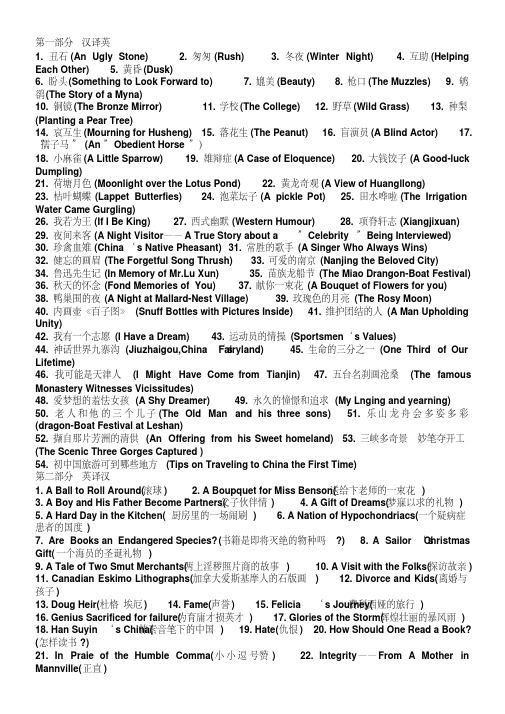
第一部分汉译英1. 丑石(An Ugly Stone)2. 匆匆(Rush)3. 冬夜(Winter Night)4. 互助(Helping Each Other)5. 黄昏(Dusk)6. 盼头(Something to Look Forward to)7. 媲美(Beauty)8. 枪口(The Muzzles)9. 鸲鹆(The Story of a Myna)10. 铜镜(The Bronze Mirror) 11. 学校(The College) 12. 野草(Wild Grass) 13. 种梨(Planting a Pear Tree)14. 哀互生(Mourning for Husheng) 15. 落花生(The Peanut) 16. 盲演员(A Blind Actor) 17. “孺子马” (An”Obedient Horse”)18. 小麻雀(A Little Sparrow) 19. 雄辩症(A Case of Eloquence) 20. 大钱饺子(A Good-luck Dumpling)21. 荷塘月色(Moonlight over the Lotus Pond) 22. 黄龙奇观(A View of Huangllong)23. 枯叶蝴蝶(Lappet Butterfies) 24. 泡菜坛子(A pickle Pot) 25. 田水哗啦(The Irrigation Water Came Gurgling)26. 我若为王(If I Be King) 27. 西式幽默(Western Humour) 28. 项脊轩志(Xiangjixuan)29. 夜间来客(A Night Visitor——A True Story about a ”Celebrity”Being Interviewed)30. 珍禽血雉(China‘s Native Pheasant)31. 常胜的歌手(A Singer Who Always Wins)32. 健忘的画眉(The Forgetful Song Thrush) 33. 可爱的南京(Nanjing the Beloved City)34. 鲁迅先生记(In Memory of Mr.Lu Xun) 35. 苗族龙船节(The Miao Drangon-Boat Festival) 36. 秋天的怀念(Fond Memories of You) 37. 献你一束花(A Bouquet of Flowers for you)38. 鸭巢围的夜(A Night at Mallard-Nest Village) 39. 玫瑰色的月亮(The Rosy Moon)40. 内画壶《百子图》(Snuff Bottles with Pictures Inside) 41. 维护团结的人(A Man Upholding Unity)42. 我有一个志愿(I Have a Dream) 43. 运动员的情操(Sportsmen‘s Values)Fairyland)45. 生命的三分之一(One Third of Our 44. 神话世界九寨沟(Jiuzhaigou,China‘sLifetime)46. 我可能是天津人(I Might Have Come from Tianjin) 47. 五台名刹画沧桑(The famous Monastery Witnesses Vicissitudes)48. 爱梦想的羞怯女孩(A Shy Dreamer) 49. 永久的憧憬和追求(My Lnging and yearning) 50. 老人和他的三个儿子(The Old Man and his three sons) 51. 乐山龙舟会多姿多彩(dragon-Boat Festival at Leshan)52. 撷自那片芳洲的清供(An Offering from his Sweet homeland) 53. 三峡多奇景妙笔夺开工(The Scenic Three Gorges Captured )54. 初中国旅游可到哪些地方(Tips on Traveling to China the First Time)第二部分英译汉1. A Ball to Roll Around(滚球)2. A Boupquet for Miss Benson(送给卞老师的一束花)3. A Boy and His Father Become Partners(父子伙伴情)4. A Gift of Dreams(梦寐以求的礼物)5. A Hard Day in the Kitchen(厨房里的一场闹刷)6. A Nation of Hypochondriacs(一个疑病症患者的国度)Christmas 7. Are Books an Endangered Species? (书籍是即将灭绝的物种吗?) 8. A Sailor‘sGift(一个海员的圣诞礼物)9. A Tale of Two Smut Merchants(两上淫秽照片商的故事) 10. A Visit with the Folks(探访故亲) 11. Canadian Eskimo Lithographs(加拿大爱斯基摩人的石版画) 12. Divorce and Kids(离婚与孩子)费利西娅的旅行)13. Doug Heir(杜格·埃厄) 14. Fame(声誉) 15. Felicia‘s Journey(16. Genius Sacrificed for failure(为育庸才损英才) 17. Glories of the Storm(辉煌壮丽的暴风雨)韩素音笔下的中国) 19. Hate(仇恨) 20. How Should One Read a Book?18. Han Suyin‘s China((怎样读书?)21. In Praie of the Humble Comma(小小逗号赞) 22. Integrity——From A Mother in Mannville(正直)23. In the Pursuit of a Haunting and Timeless Truth(追寻一段永世难忘的史实)24. Killer on Wings is Under Threat(飞翔的杀手正受到威胁) 25. Life in a Violin Case(琴匣子中的生趣)26. Love Is Not like Merchandise(爱情不是商品) 27. Luck(好运气) 28. Mayhew(生活的道路)29. My Averae Uncle(艾默大叔——一个普通人) 30. My Father‘s Music(我父亲的音乐) 31. My Mother‘s Gift (母亲的礼物)32. New Light Buld Offers Energy Efficiency(新型灯泡提高能效) 33. Of Studies(谈读书)34. On Leadership(论领导) 35. On Cottages in General(农舍概述) 36. Over the Hill(开小差) 37. Promise of Bluebirds(蓝知更鸟的希望) 38. Stories on a Headboard(床头板上故事多)39. Sunday(星期天) 40. The Blanket(一条毛毯) 41. The Colour of the Sky(天空的色彩) 42. The date Father Didn‘t Keep(父亲失约) 43. The Kiss(吻) 44. The Letter(家书)45. The Little Boat That Sailed through Time(悠悠岁月小船情) 46. The Living Seas(富有生命的海洋)47. The Roots of My Ambition(我的自强之源) 48. The song of the River(河之歌)49. They Wanted Him Everywhere——Herbert von Karajan(1908-1989) (哪儿都要他)50. Three Great Puffy Rolls(三个又大双暄的面包圈) 51. Trust(信任)52. Why measure Life in Hearbeats? (何必以心跳定生死?) 53. Why the bones Break(骨折缘何而起)54. Why Women Live Longer than Men(为什么女人经男人活得长)丑石贾平凹我常常遗憾我家门前的那块丑石呢:它黑黝黝地卧在那里,牛似的模样;谁也不知道是什么时候留在这里的.谁也不去理会它。
张培基现代散文翻译精选分享
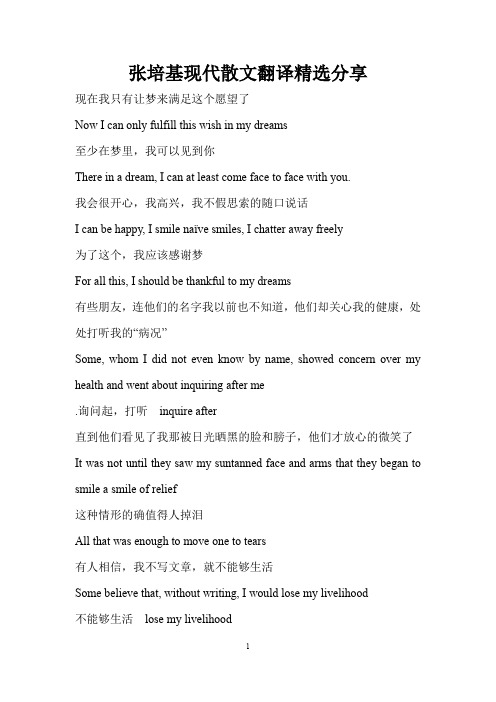
张培基现代散文翻译精选分享现在我只有让梦来满足这个愿望了Now I can only fulfill this wish in my dreams至少在梦里,我可以见到你There in a dream, I can at least come face to face with you.我会很开心,我高兴,我不假思索的随口说话I can be happy, I smile naïve smiles, I chatter away freely为了这个,我应该感谢梦For all this, I should be thankful to my dreams有些朋友,连他们的名字我以前也不知道,他们却关心我的健康,处处打听我的“病况”Some, whom I did not even know by name, showed concern over my health and went about inquiring after me.询问起,打听inquire after直到他们看见了我那被日光晒黑的脸和膀子,他们才放心的微笑了It was not until they saw my suntanned face and arms that they began to smile a smile of relief这种情形的确值得人掉泪All that was enough to move one to tears有人相信,我不写文章,就不能够生活Some believe that, without writing, I would lose my livelihood不能够生活lose my livelihood有个同情我的朋友寄稿到《广州民国日报》的副刊,说了许多关于我的生活的话One of my sympathizers, in an article published two months ago in the Guangzhou republic daily supplement, gives a full account of the conditions of my life他也说,我一天不写文章第二天就没有饭吃He also says that I would have nothing to live on once I should lay down my pen这不是确实的That is not true at all这次旅行就给我证明,即使我不再写一个字,朋友们也不肯让我冻馁It has already been proved by my recent travels that my friends would never let me suffer from cold and hunger even if I should go without writing a single word.世间还有许多慷慨的人,他们不把自己个人和家庭看得异常重要,超过一切There are a great many kind-hearted people in the world who never attach undue importance to themselves and their families and who never place themselves and place their families above anything else靠了他们我才活到现在,而且靠了他们我还要活下去It is owing to them that I still survive and shall continue to survive for a long time to come朋友们给我的东西太多太多了I owe my friends many, many things。
张培基散文第一辑

艰难的国运与雄健的国民李大钊历史的道路,不会是坦平的,有时走到艰难险阻的境界。
这是全靠雄健的精神才能冲过去的(1)。
一条浩浩荡荡的长江大河,有时流到很宽阔的境界(2),平原无际,一泻万里(3)。
有时流到很逼狭的境界,两岸丛山迭岭,绝壁断崖,江河流于期间,回环曲折,极其险峻(4)。
民族生命的进展,其经历亦复如是。
人类在历史上的生活正如旅行一样。
旅途上的征人(5)所经过的地方,有时是坦荡平原,有时是崎岖险路(6)。
志于旅途的人,走到平坦的地方,因是高高兴兴地向前走,走到崎岖的境界,俞是奇趣横生(7),觉得在此奇绝壮绝(8)的境界,俞能感到一种冒险的美趣(9)。
中华民族现在所逢的史路,是一段崎岖险阻的道路。
在这段道路上,实在亦有一种奇绝壮绝的境至,使我们经过此段道路的人,感得一种壮美的趣味,是非有雄健的精神的,不能够感觉到的。
我们的扬子江、黄河,可以代表我们的民族精神,扬子江及黄河遇见沙漠、遇见山峡都是浩浩荡荡的往前流过去,以成其浊流滚滚,一泻万里的魄势(10)。
目前的艰难境界,那能阻抑我们民族生命的前进。
我们应该拿出雄健的精神,高唱着进行的曲调,在这悲壮歌声中,走过这崎岖险阻的道路。
要知(11)在艰难的国运中建造国家,亦是人生最有趣味的事……。
National Crisis vs Heroic NationLi DazhaoThe course of history is never smooth. It is sometimes beset with difficulties andobstacles and nothing short of a heroic spirit can help surmount them.A mighty long river sometimes flows through a broad section with plains lyingboundless on either side, its waters rolling on non-stop for thousands upon thousands ofmiles. Sometimes it comes up against a narrow section flanked by high mountains andsteep cliffs, winding through a course with many a perilous twist and turn. A nation, in the course of its development, fares likewise.The historical course of man’s life is just like a journey. A traveler on a long journeypasses through now a broad, level plain, now a rugged, hazardous road. While adetermined traveler cheerfully continues his journey upon reaching a safe and smoothplace, he finds it still more fascinating to come to a rugged place, the enormouslymagnificent spectacle of which, he feels, is better able to generate in him a wonderfulsensation of adventure.The Chinese nation is now confronted with a rugged and dangerous section of itshistorical course. Nevertheless, there is also in this section a spectacle of enormous magnificence that inspires in us passers-by a delightful sensation of splendor. And thisdelightful sensation, however, can only be shared by those with a heroic spirit.The Y angtse River and the Y ellow River are both symbolic of our national spirit thetwo mighty rivers negotiate deserts and gorges until their turbid torrents surge forwardwith irresistible force. The present national crisis can never obstruct the advance of ournational life. Let us brace up our spirits and march through this rugged, dangerous road tothe tune of our solemn, stirring songs. The greatest joy of life, mind you, is to build up our country during its most difficult days.注释:李大钊此文载于1923年12月20日《新国民》第一卷第2号上,短小隽永,堪称一首诗意盎然的抒情散文诗。
- 1、下载文档前请自行甄别文档内容的完整性,平台不提供额外的编辑、内容补充、找答案等附加服务。
- 2、"仅部分预览"的文档,不可在线预览部分如存在完整性等问题,可反馈申请退款(可完整预览的文档不适用该条件!)。
- 3、如文档侵犯您的权益,请联系客服反馈,我们会尽快为您处理(人工客服工作时间:9:00-18:30)。
第一部分汉译英1. 丑石(An Ugly Stone)2. 匆匆(Rush)3. 冬夜(Winter Night)4. 互助(Helping Each Other)5. 黄昏(Dusk)6. 盼头(Something to Lookl Forward to)7. 媲美(Beauty)8. 枪口(The Muzzles)9. 鸲鹆(The Story of a Myna)10. 铜镜(The Bronze Mirror)11. 学校(The College)12. 野草(Wild Grass)13. 种梨(Planting a Pear Tree)14. 哀互生(Mourning for Husheng)15. 落花生(The Peanut)16. 盲演员(A Blind Actor)17. “孺子马” (An”Obedient Horse”)18. 小麻雀(A Little Sparrow)19. 雄辩症(A Case of Eloquence)20. 大钱饺子(A Good-luck Dumpling)21. 荷塘月色(Moonlight over the Lotus Pond)22. 黄龙奇观(A View of Huangllong)23. 枯叶蝴蝶(Lappet Butterfies)24. 泡菜坛子(A pickle Pot)25. 田水哗啦(The Irrigation Water Came Gurgling)丑石贾平凹我常常遗憾我家门前的那块丑石呢:它黑黝黝地卧在那里,牛似的模样;谁也不知道是什么时候留在这里的.谁也不去理会它。
只是麦收时节,门前摊了麦子,奶奶总是要说:这块丑石,多碍地面哟,多时把它搬走吧。
(更多翻硕备考文件、真题请移步围脖@资源小巴)于是,伯父家盖房,想以它垒山墙,但苦于它极不规则,没棱角儿,也没平面儿;用赘破开吧,又懒得花那么大气力,因为河滩并不甚远.随便去掬一块回来,哪一块也比它强。
房盖起来,压铺台阶,伯父也没有看上它。
有一年,来了一个石匠,为我家洗一台石磨,奶奶又说:用这块五石吧,省An Ugly StoneJia PingwaI used to feel sorry for that ugly black piece of stone lying like an ox in front of our door; none knew when it was left there and none paid any attention to it, except at the time when wheat was harvested and my grandma, seeing the grains of wheat spread all over the ground in the front yard of the house, would grumble: "This ugly stone takes so much space. Move it away someday. " Thus my uncle had wanted to use it for the gable when he was building a house, but he was troubled to find it of very irregular shape, with no edges nor corners, nor a flat plane on it. And he wouldn't bother to break it in half with a chisel because the river bank was nearby, where he could have easily fetched a much better stone instead. Even when my uncle was busy with the flight of steps leading to the new house he didn't take a fancy to the ugly stone. One year when a mason came by, we asked him to snake us a stone mill with it. As my grandma put it: "Why得从远处搬动。
石匠看了看,摇着头,嫌它石质太细,也不采用。
它不像汉白玉那样的细腻,可以凿下刻字雕花,也不像大青石那样的光滑,可以供来院纱捶布;它静静地卧在那里,院边的槐荫没有庇孤它,花儿也不再在它身边生长。
荒草便繁衍出来,枝蔓上下,慢慢地,竟锈上了绿苔、黑斑。
我们这些做孩子的,也讨庆起它来,曾合伙要搬走它,但力气又不足;虽时时咒骂它,嫌弃它,也无可奈何,只好任它留在那里去了。
稍稍能安慰我们的,是在那石上有一个不大不小的坑凹儿,雨天就盛满了水。
常常雨过三天了.地上已经于燥,那石凹里水儿还有,鸡儿便去那里渴饮。
每每到了十五的夜晚,net take this one, so you worst have to fetch one from afar." But the arson took a look and shook his head; he wouldn't take it for it was of too fine a quality.It was not like a fine piece of white marble on which words or flowers could be carved, nor like a smooth big bluish stone people used to wash their clothes on. The stone just lay there in silence, enjoying no shading front the pagoda trees by the yard, nor flowers growing around it. As a result weeds multiplied and stretched ail over it, their stems and tendrils gradually covered with dark green spots of moss. We children began to dislike the stone too, and would have taken it away if we had been strong enough; all we could do for the present was to leave it alone, despite our disgust or even curses.The only thing that had interested us in the ugly stone was a little pit on top of it, which was filled with water on rainy days. Three days after a rainfall, usually, when the ground had become dry, there was still water in the pit, where我们盼着满月出来,就爬到其上,翘望天边;奶奶总是要骂的,害怕我们摔下来。
果然那一次就摔了下来,磕破了我的膝盖呢。
人都骂它是丑石,它真是丑得不能再丑的丑石了。
终有一日,村子里来了一个天文学家。
他在我家门前路过,突然发现了这块石头,眼光立即就拉直了。
他再没有走去,就住了下来;以后又来了好些人,说这是一块陨石,从天上落下来己经有二三百年了,是一件了不起的东西。
不久便来了车,小心翼翼地将它运走了。
这使我们都很惊奇!这又怪又丑的石头,原来是天上的呢!它补过天,在天上发过热,闪过光,我们的先祖或许仰望过它,它给了他们光明、向往、chickens went to drink. And every month when it came to the evening of the 15th of lunar calendar, we would climb onto the stone, looking up at the sky, hoping to see the full moon come out from far away. And Granny would give us a scolding, afraid lest we should fall down--and sure enough, I fell down once to have my knee broken. So everybody condemned the stone: an ugly stone, as ugly as it could be.Then one day an astronomer came to the village. He looked the stone square in the eye the moment he came across it. He didn't take his leave but decided to stay in our village. Quite a number of people came afterwards, saying the stone was a piece of aerolite which had fallen down from the sky two or three hundred years ago-what a wonder indeed! Pretty soon a truck carne, and carried it away carefully.It gave us a great surprise! We had never expected that such a strange and ugly stone should have come from the sky! So it had once mended the sky, given out its heat and light憧憬:而它落下来了,在污土里,荒草里,一躺就是几百年了?!奶奶说: “真看不出:它那么不一般,却怎么连墙也垒不成,台阶也垒不成呢?”“它是太丑了。
